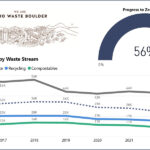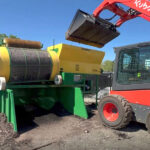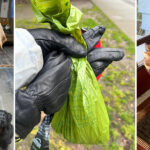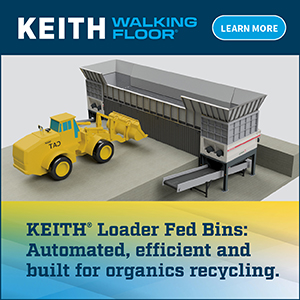Neil Seldman
Why does each modern industrial economy annually treat hundreds of millions of valuable raw materials with embedded capital, extraction, energy and labor costs as waste? And then spend extravagantly to transform waste into threats to the economy and environment through landfilling and incineration? The practical reason is that these materials are all mixed and crushed so they cannot be economically recovered as secondary materials for industry and agriculture. All the value is destroyed and the earth and its inhabitants are less well off as a result.
William Leiss points to the deeper determinants for our current circumstances in his 1976 essay, “The Limits To Satisfaction” — The permissive use of Nature as a free warehouse for industry and a free sink for its waste. The by-products of production, instead of serving as the feedstock for more production, become ”excretions of production” left to destroy our wellbeing.
Gerry Gillespie is an international Zero Waste campaigner known for his expertise in the recovery of organic materials and the reuse of these materials for non-polluting, high productivity agriculture. He addresses how to approach both the immediate practical solutions to recycling, composting and reuse, as well as the long term socio-economic assumptions that promote and propel wasting in his new book, The Waste Between Our Ears (Acres USA Press, 2020). The key is not in the stars but in our minds’ eye. Gillespie’s apt subtitle reads: “The Missing Ingredient to Disrupt Climate Change is in the Trash”. People first handle everything that becomes trash, at home, school or play. Waste is a decision that has to be made. “It’s not waste until you waste it,” says Mary Lou Van Deventer, principal of Urban Ore. To date the decision to waste is dominated by a billion dollar sector pushing consumption-based lifestyles come hell or high water and a wasting industry to accommodate a ”throw away” society! “The only place that waste exists is between our ears, because waste is not a fact — it is a concept,” writes Gillespie.
Well it seems that hell and high water are coming, along with global infections, fires and floods. The last time Americans were hit with burning rivers, massive oil spills and hundreds of deaths from air inversions over urban centers in the late1960s, a new environmental consciousness and conventional wisdom was formed. Powerful images of wasting were reinforced by ideas from scientists and theorists Barry Commoner, Murray Bookchin and Rachel Carson in the early 1960s. Reform and progress followed, but the Clean Air and Clean Water Acts of the 1970s hardly changed the patterns of consumptive and wasteful lifestyles.
The question is will current environmental and health calamities bring with it a new way of thinking? Can we change our minds and our behavior? Will our response be more radical — focus on root causes — than in the 1960s in the quest for an ample and sustainable human existence? Gillespie’s book is a welcome addition to our Zero Waste library of books from Zero Waste luminaries who include Sea Captain Charles Moore; chemistry professor Paul Connett; Greenpeace USA director Annie Leonard; and physicist Paul Palmer. Gillespie joins them in providing both profound and practical ideas to address our fearful circumstances.
The Waste Between Our Ears includes eight original poems by the author introducing each chapter (see box). The book is focused on the author’s home country, Australia, and nearby New Zealand, but includes considerations and insights from his frequent travels around the world. Gillespie’s attention is primarily focused on organic matter, but includes detailed analysis and planning for keeping traditionally recycled materials separate to maintain value in communities.
Recycling Options
Source separated collection is the key to recovering the full value of materials that replace the need for extracting virgin ores and fiber: clean materials for markets, no complex and unnecessary processing facilities. Gillespie highlights practices in Wales with curb sort of materials in custom small vehicles; the Zabbaline people in Egypt who perfected a door to door dry/wet system with manual and mechanical systems that allows for local production of paper, cardboards, clean pelletized plastic and topsoil from compost; and the Xtreme Zero Waste community-owned company in Raglan, New Zealand that has achieved 74% diversion from landfill and is turning
Raglan’s waste into resources for employment and environmental benefit while moving toward zero waste.
In order to help communities take back materials from traditional waste collection, Gillespie provides sections on local recycling and use of paper and cardboard, food scraps, wood, plastic, glass and ceramics, metals, textiles, motor and cooking oils and chemicals. Each section includes tips for handling materials, processes, types of tools and equipment needed to move forward at the local level.
Organics Options
Gillespie introduced the ”City to Soils” program in 2003 as a practical example of putting resources into soils, ”to stop the desecration of a source of the planet’s life.” In a section on Science, Soils and Social Insanity he avers, we must “embrace the soil as our mother”, to interconnect composting with food production in order to survive and prosper. “Waste is a metaphor for our own attitude toward the planet.…We must invest in soil, not consume it.” Taking control of our organic base “provides the tools to link the community to its food supply”.
Seventy percent of the waste stream is organic offering an endless array of strategies. Gillespie lists regulations — carbon credits, local control over ”waste” streams — and practical steps for using road kill, crop stubble, and weeds for compost as well as liquid foliar sprays. He highlights “false and untested science that tells us it is safe to poison the soil and its biological processes to produce food.”
Waste is the metaphor for destruction of the planet. Alternatively, clean air, polished water and good jobs and working conditions await communities that see feedstock materials, not waste. Addressing each material in an interconnected fashion can yield these benefits. Gillespie shows his passionate concern for organic matter: how it is wasted, and the many forms of value that can be derived from it.
In times of rising heat, fire and rising waters, The Waste Between Our Ears presents recycling and composting as the means to achieve a zero waste economy based on a society that is cleaner, more productive and equitable for all.
Neil Seldman, Ph.D, directs the Institute for Local Self-Reliance’s Waste to Wealth Initiative. He specializes in helping cities and businesses recover increasing amounts of materials from the waste stream and add value to the local economy through new processing and manufacturing facilities. References cited in this book review include: William Leiss’ The Limits to Satisfaction: An Essay on the Problem of Needs and Commodities, 1976; Murray Bookchin’s Our Synthetic Environment, 1962; Rachel Carson’s Silent Spring, 1962; Barry Commoner’s Science and Survival, 1966; Charles Moore’s Plastic Ocean, 2011; Paul Connett’s Zero Waste, 2013; Annie Leonard’s Story of Stuff, 2008; and Paul Palmer’s Getting to Zero Waste, 2005.













